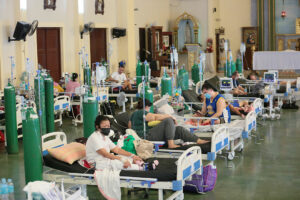A BILL seeking to allot at least 5% of the country’s gross domestic product (GDP) towards healthcare spending was filed at the House of Representatives on Wednesday.
Setting aside at least P1.3 trillion for public health spending could help improve the quality of government hospitals and clinics, helping boost healthcare accessibility nationwide, Party-list Reps. Antonio L. Tinio and Renee Louise M. Co said in the explanatory note of House Bill No. 1973.
Increasing funding for the health sector would also lead to lower out-of-pocket expenses for the hospitalization and medical needs of Filipinos, which currently rank the third highest in Southeast Asia, they added.
Just last week, Malacañang said President Ferdinand R. Marcos, Jr. is looking to reduce, if not eliminate, the out-of-pocket expense of Filipinos when they are hospitalized.
“The Philippines’ public spending on health, which was about 1.5% of the GDP, was much lower than that of Thailand, Vietnam, Singapore and Malaysia, which spent four times more,” they said in the bill.
The measure seeks to amend the 1997 Administrative Code by explicitly citing that 5% of the GDP should be spent on “public health expenditures.”
The 1987 Philippine Constitution mandates the government to “protect and promote” the right to health, while adopting an “integrated and comprehensive” approach towards health development, Mr. Tinio and Ms. Co said, citing it as the basis for their proposal.
The Congressional Policy and Budget Research Department said in a July report that almost half of Filipinos need to travel more than 30 minutes to access hospitals despite the implementation of the almost two-decade-old Health Facilities Enhancement Program.
Funding could be sourced by diverting “non-productive” government expenditures towards healthcare programs, citing debt servicing, secret funds, and discretionary allocations as potential sources of funds, they said.
“Progressive taxation like a wealth tax on the super-rich, as well as bigger taxes on big corporations can provide the needed additional funds,” they added.
Finance Secretary Ralph G. Recto last year said he is not keen on pushing for a wealth tax, as the Philippines already has enough duties.’
Mr. Tinio and Ms. Co also earlier proposed a measure seeking to set a spending floor of at least 6% for the education sector in a bid to improve the country’s schooling system. — Kenneth Christiane L. Basilio
